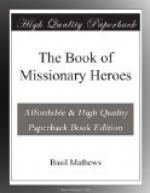As the night drew on the plain grew rougher: then it began to rise to the foothills and mountains. At last the pony and mules were clambering up rough steep paths so wild that there was (as Martyn said) “nothing to mark the road but the rocks being a little more worn in one place than in another.” Suddenly in the darkness the pony stopped; dimly through the gloom Martyn could see that they were on the edge of a tremendous precipice. A single step more would have plunged him over, to be smashed on the rocks hundreds of feet below. Martyn did not move or try to guide the beast: he knew that the pony himself was the safest guide. In a minute or two the animal moved, and step by step clambered carefully up the rock-strewn mountain-side.
At last they came out on the mountain top, but only to find that they were on the edge of a flat high plain—a tableland. The air was pure and fresher; the mules and the travellers revived. Martyn’s pony began to trot briskly along. So, as dawn came up, they came in sight of a great courtyard built by the king of that country to refresh pilgrims.
Through night after night they tramped, across plateau and mountain range, till they climbed the third range, and then plunged by a winding rocky path into a wide valley where, at a great town called Kazrun, in a garden of cypress trees was a summer-house.
Martyn lay down on the floor but could not sleep, though he was horribly weary. “There seemed,” he said, “to be fire within my head, my skin like a cinder.” His heart beat like a hammer.
They went on climbing another range of mountains, first tormented by mosquitoes, then frozen with cold; Martyn was so overwhelmed with sleep that he could not sit on his pony and had to hurry ahead to keep awake and then sit down with his back against a rock where he fell asleep in a second, and had to be shaken to wake up when Zechariah, the Armenian mule driver, came up to where he was.
They had at last climbed the four mountain rungs of the ladder to Persia, and came out on June 11th, 1811, on the great plain where the city of Shiraz stands. Here he found the host Jaffir Ali Khan, to whom he carried his letters of introduction. Martyn in his Persian dress, seated on the ground, was feasted with curries and rice, sweets cooled with snow and perfumed with rose water, and coffee.
Ali Khan had a lovely garden of orange trees, and in the garden Martyn sat. Ill as he was, he worked day in and day out to translate the life of Jesus Christ in the New Testament from the Greek language into pure and simple Persian. The kind host put up a tent for Martyn in the garden, close to some beautiful vines, from which hung lovely bunches of purple grapes. By the side of his tent ran a clear stream of running water. All the evening nightingales sang sweetly and mournfully.
As he sat there at his work, men came hundreds of miles to talk with this holy man, as they felt him to be. Moslems—they yet travelled even from Baghdad and Bosra and Isfahan to hear this “infidel” speak of Jesus Christ, and to argue as to which was the true religion. Prince Abbas Mirza invited him to come to speak with him; and as Martyn entered the Prince’s courtyard a hundred fountains began to send up jets of water in his honour.




